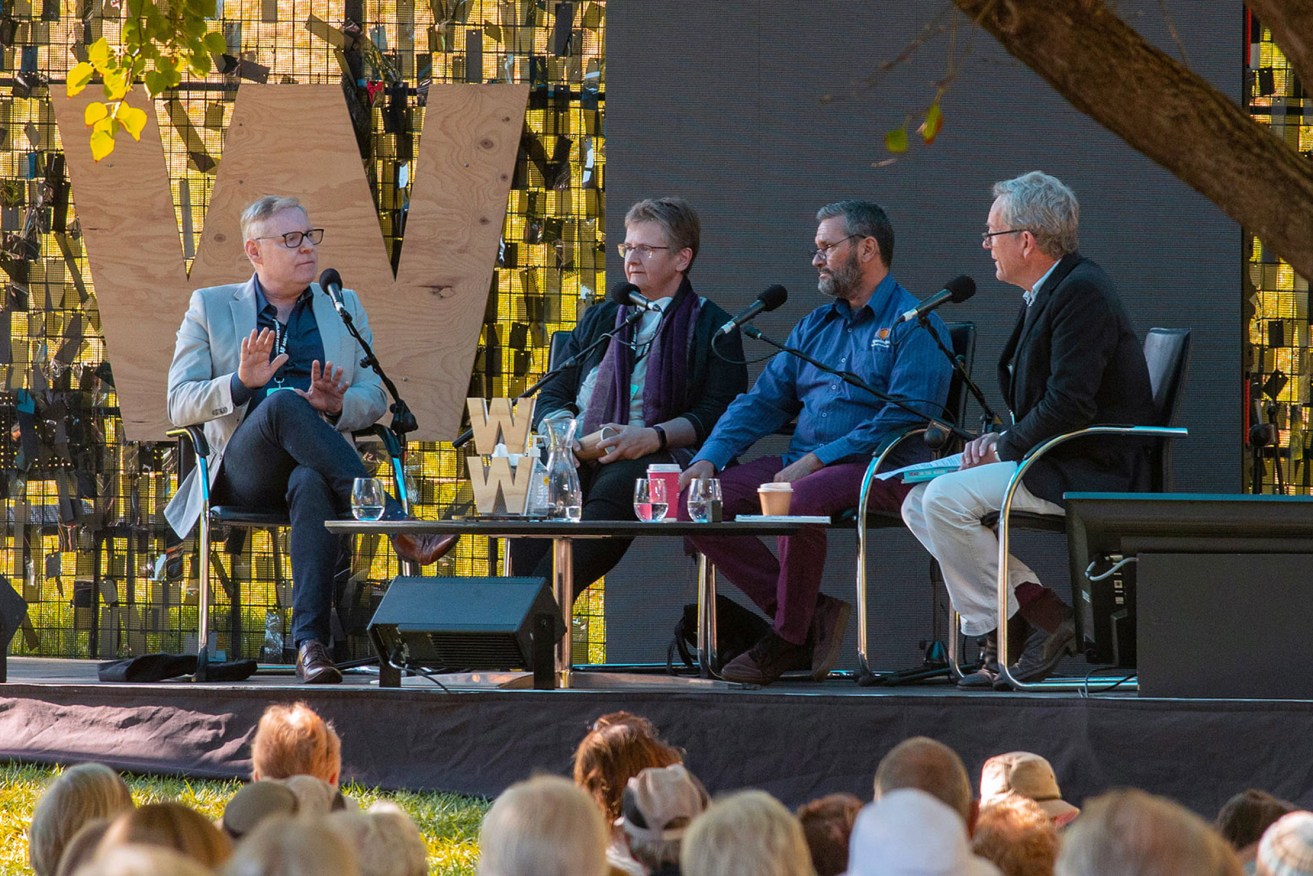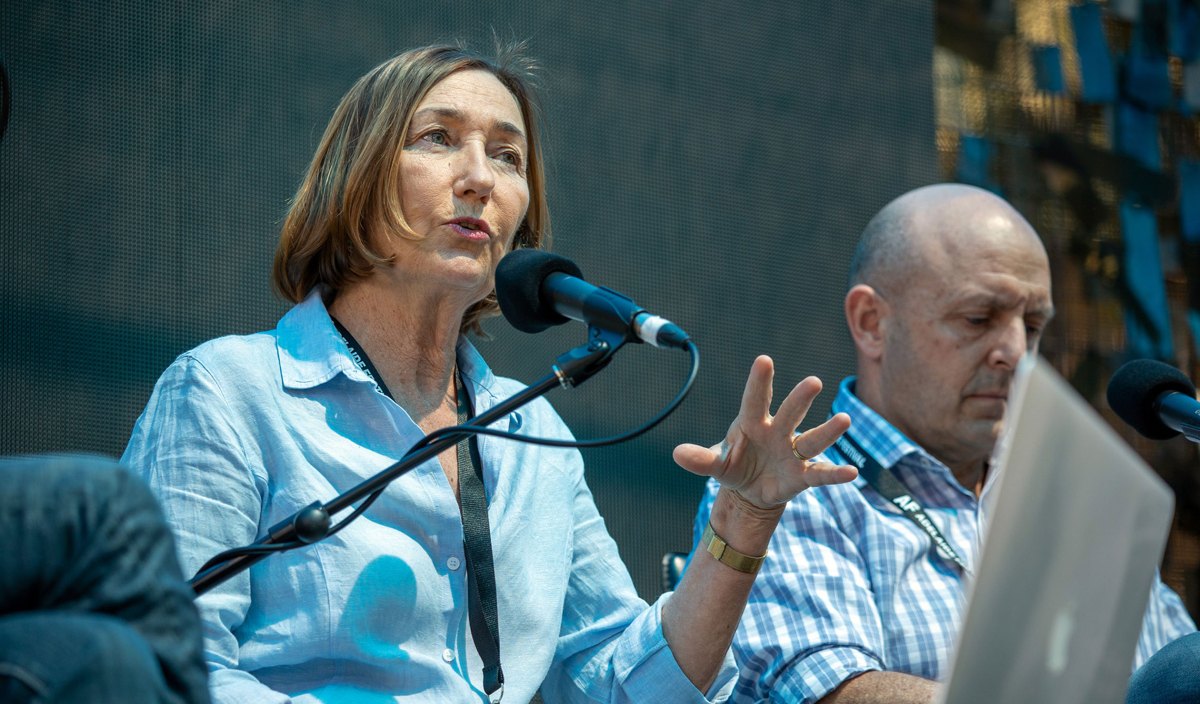Dry argument: The trouble with almonds
At an early autumn Writers’ Week discussion about the ruin of the Murray-Darling River system it was revealed – depressingly – that South Australia is the source of a new and particularly thirsty problem: almonds.


The River Runs Dry: Writers' Week guests Richard Beasley, Margaret Simons and Grant Rigney with session chair Rick Sarre. Photo: Tony Lewis
Author Margaret Simons, whose Quarterly essay Cry Me A River was published last March, said those well-intentioned people who may have switched to almond milk to help the environment should think again.
“We probably shouldn’t be growing almonds, either,” she told a Writers’ Week session titled The River Runs Dry.
While the fight continued to sustainably manage a river system crossing four states, almonds were taking over from cotton as the worst of all crops. And the growth in almond growing was happening unchecked because it was supported by water that was traded to the highest bidder.
“If you just let that rip, we will have a basin that is dominated by cotton and almonds, and that’s the South Australian part of the story,” she said. “Far from irrigation being retired from the Sunraysia and South Australian region, it has increased due to water trading.”
Simons said a trip around Renmark and Loxton revealed hectares and hectares of new almond plantations whose small trees were already greedy for water. While rice growing had declined, almond production was rapidly expanding, and it was one of the thirstiest crops of all.
Simons, who travelled along the river system from Queensland to South Australia for her research, said she was a great defender of farmers trying to make a living, but not the crops they were growing.
“I think it’s a huge mistake if we have any chance at all of getting out of this mess to blame individual farmers who have been encouraged and incentivised by governments to do what they’re doing, and are folk, right?” she said. “They’re just like the rest of us, trying to raise families and make a quid.”
Richard Beasley SC, who was senior counsel assisting the Murray-Darling Royal Commission ordered by the Weatherill Government, said cotton and rice were water-intensive but did not have to be sustained year round, whereas almond trees had to be permanently fed. In the absence of regulations, very large companies, including some that were foreign-owned, had come in with deep pockets, planting hectare after hectare of them.
“Because these are big companies and because they have deep pockets, they can outbid your ordinary farmer for water and that is an utterly terrible system and it is scandalous that the government has allowed that to happen,” he said. “It takes 35 litres of water to grow an almond.”
As to a future blighted by climate change, Beasley said the laws of physics would have to change to stop it from getting hotter and drier. An expected temperature rise of 2C would cut water runoff into the Basin by 30 per cent.
“That is catastrophic,” Beasley said.
In real terms, it may also be bordering on unliveable. A rise in temperature of 2C might sound moderate but it was not the difference in temperature between a 24C and a 26C day.
“A town like Fresno in California, or let’s call it Mildura, or Renmark, historically has a week of 100 degrees plus, or 40C,” Beasley said. “By 2050 to 2070 ,we are looking at five to six weeks of every summer being 40C. That’s when crops die.”

Investigative journalist Marian Wilkinson at Adelaide Writers’ Week. Photo: Tony Lewis
At the not unrelated session about corruption, Land of Mates and Favours – one of a handful of events this year able to be streamed at home – investigative journalist Marian Wilkinson said the resources lobby was hugely powerful and had infiltrated the highest levels of government.
“The resources lobby, and particularly the coal and gas lobbies, have been hugely influential on climate policy in the last 25 years and that influence hasn’t, I don’t think, ceased,” she said. “It has pushed back Australia’s transition to a clean air economy.”
During her research she was struck by the incredible paucity of thinking in internal meetings that failed to even envisage that carbon-based industries would one day decline.
“When you look at that, in 2021, how big a failure was that?” she said.
Sharing the stage, Richard Denniss, chief economist of the Australia Institute, said there were two versions of corruption – the brown-paper-bag type, which was bad, and corrupted public policy processes, which were worse.
As a result, far from moving to a post-carbon, cleaner-energy future, which meant transitioning out of fossil fuel, Australia was quietly transitioning towards it with no consideration for the impact on climate change.
“Australia doubled its coal export in the last 10 years and we are planning more,” Denniss said. “It’s worse than brown paper bags. We are transitioning into fossil fuels at a very dumb time to do it – because there is still a lot of money to be made in the short term.”
For more InReview coverage of Writers’ Week, click here.




